综英第四册 unit 9课前词汇
新编英语教程学生用书4 综英unit9
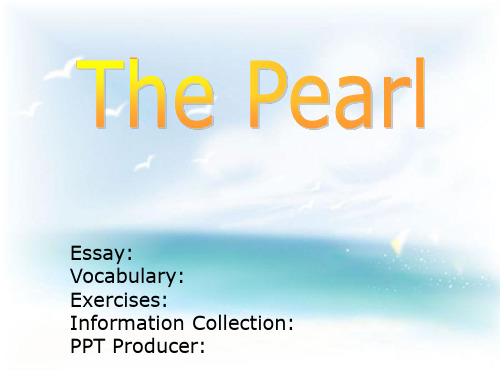
Essay: Vocabulary: Exercises: Information Collection: PPT Producer:Warming--up QuestionsDo you possess any jewelry with pearls?If no, do you want one?Why?Rings EarringsNecklaces Pendants吊坠Bracelets手镯Background 1,Author➢John Ernst Steinbeck, Jr.(February27, 1902 –December 20, 1968) wasone of the most famous Americanwriter of the 20th century.➢Steinbeck's novels dealing with the economic problems of rural labor.➢He is widely known for the PulitzerPrize-winning novel The Grapes ofWrath (1939), East of Eden (1952) andthe novella Of Mice and Men (1937).➢As the author of twenty-seven books, including sixteen novels, six non-fiction books, and five collections of shortstories, Steinbeck received the NobelPrize for Literature in 1962.2,The Pearl➢The Pearl is a novella by American author John Steinbeck, published in1947. It is the story of a pearl diver,Kino, and explores man's nature aswell as greed and evil.➢Steinbeck's inspiration was a Mexican folk tale from La Paz, Baja CaliforniaSur, Mexico, which he had heard in a visit to the formerly pearl-rich region in 1940.➢In 1947, it was adapted into a Mexican film named La perla.➢The story is one of Steinbeck's most popular books and has been widelyused in high school classes.3,La perla➢La perla ("The pearl")is a1947 Mexican film.➢The story is based on thenovella The Pearl by JohnSteinbeck, who also co-wrotethe screenplay for the movie.Skimming(5 minutes)➢What do we know about Kino?A poor fisherman/lives in a brush house/has a child/in great need of money➢What was the news in the town?(sum in a sentence) Kino, a fisherman, had found the Pearl of the World.➢Which people were particularly interested in the Pearl? The priest/the shopkeepers/the doctor/the beggars/the agents of the buyer of pearlsPart Division of the Text Directions: Please divide the text into 3 parts andsummarize the main idea of each part. Part1(Para.1)The news travels very fast in the town.Part2(Para.2--Para.5)How the townspeople react towards the news.Part3(Pare.6)Analysis of people's reaction.Further UnderstandingNews seems to move faster than small boys can scramble and dart to tell it, faster than women can call it over the fences.(L4)Small boys are always unable to keep quietabout anything they know, and tend to runaround talking about it; women are likewise supposedly good at spreading news through gossiping; but the news that Kino had a largeand valuable pearl traveled faster than either....the nerves of the town were pulsing and vibrating with the news--Kino had found the Pearl of the World.(L7) Paraphrase this sentence:The town was alive with thenews that Kino had found thePearl of the World.Background Information:Kino found the Pearl of theWorld when he was out fishing,but before he reached home,the news had already spreadthrough the whole town andwas on everyone's lip.Before panting little boys could strangleout the words, their mothers knew it.(L8)Paraphrase this sentence:The mothers had already learned the newsbefore their sons could stammer it out.The news swept on past the brush houses,and it washed in a foaming wave into the town of stone and plaster.(L9) Paraphrase this sentence:The news spread from one brush house to anotherand continued to travel fast into the town.Every man suddenly became related to Kino's pearl, ... ,so taht he became curiously every man's enemy.(L38)Background Information:In the following part,various people attempt tomurder Kino for the pearl,but they all fail.VocabularyScramble(L4)V.1.to move quickly, especially with difficulty(迅速而吃力地)爬,攀登she managed to scramble over the wall.她好不容易翻过了墙。
综合教程第四册Unit 9 Text I 词汇学习
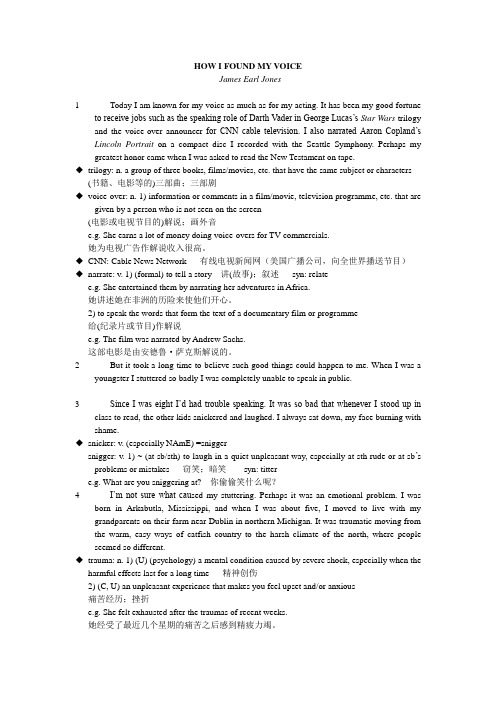
HOW I FOUND MY VOICEJames Earl Jones1 Today I am known for my voice as much as for my acting. It has been my good fortuneto receive jobs such as the speaking role of Darth Vader in George Lucas’s Star Wars trilogy and the voice-over announcer for CNN cable television. I also narrated Aaron Copland’s Lincoln Portrait on a compact disc I recorded with the Seattle Symphony. Perhaps my greatest honor came when I was asked to read the New Testament on tape.◆trilogy: n. a group of three books, films/movies, etc. that have the same subject or characters(书籍、电影等的)三部曲;三部剧◆voice-over: n. 1) information or comments in a film/movie, television programme, etc. that aregiven by a person who is not seen on the screen(电影或电视节目的)解说;画外音e.g. She earns a lot of money doing voice-overs for TV commercials.她为电视广告作解说收入很高。
◆CNN: Cable News Network 有线电视新闻网(美国广播公司,向全世界播送节目)◆narrate: v. 1) (formal) to tell a story 讲(故事);叙述syn: relatee.g. She entertained them by narrating her adventures in Africa.她讲述她在非洲的历险来使他们开心。
新概念英语第四册第9课Royal espionage

新概念英语第四册第9课:Royal espionageLesson 9 Royal espionage王室谍报活动听录音,然后回答以下问题。
What important thing did King Alfred learn when he penetrated the Danish campof Guthrum?Alfred the Great acted his own spy, visiting Danish camps disguised as a minstrel. In those days wandering minstrels were welcome everywhere. They were notfighting men, and their harp was their passport. Alfred had learned many of their ballads in his youth, and could vary his programme with acrobatic tricks and simple conjuring.阿尔弗雷德大帝曾亲自充当间谍。
他扮作吟游歌手到丹麦军队的营地里侦察。
当时,浪迹天涯的吟游歌手到处受欢迎,他们不是作战人员,竖琴就是他们的通行证。
阿尔弗德年轻时学过许多民歌,并能穿插演一些杂技和小魔术使自己的节目多样化。
While Alfred's little army slowly began to gather at Athelney, the king himself set out to penetrate the camp of Guthrum, the commander of the Danish invaders. There had settled down for the winter at Chippenham: thither Alfred went. He noticed at once that discipline was slack: the Danes had the self-confidence of conquerors, and their security precautions were casual. They lived well, on the proceeds of raids on neighbouring regions. There they collected women as well as food and drink, and a life of ease had made them soft.阿尔弗雷德人数不多的军队开始在阿塞尔纳慢慢集结时,他亲自潜入丹麦入侵司令官古瑟罗姆的营地。
最新新概念英语第四册Lesson9~11生词和短语
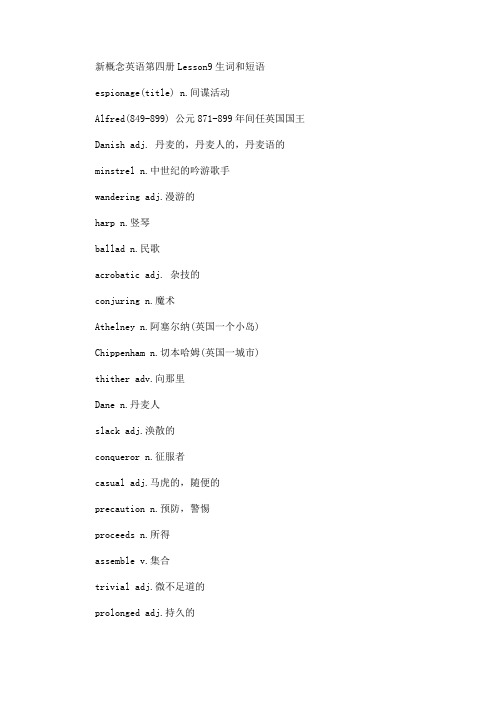
新概念英语第四册Lesson9生词和短语espionage(title) n.间谍活动Alfred(849-899) 公元871-899年间任英国国王Danish adj. 丹麦的,丹麦人的,丹麦语的minstrel n.中世纪的吟游歌手wandering adj.漫游的harp n.竖琴ballad n.民歌acrobatic adj. 杂技的conjuring n.魔术Athelney n.阿塞尔纳(英国一个小岛) Chippenham n.切本哈姆(英国一城市)thither adv.向那里Dane n.丹麦人slack adj.涣散的conqueror n.征服者casual adj.马虎的,随便的precaution n.预防,警惕proceeds n.所得assemble v.集合trivial adj.微不足道的prolonged adj.持久的commissariat n.军粮供应episode n.一个事件,片断epic n.史诗harry v.骚扰assail v.袭击skirmish n.小规模战斗新概念英语第四册Lesson10生词和短语oppress v.忧郁,压抑justification n.正当理由justifiably adv.无可非议地cheat v.欺骗abject adj.可怜的ignoble adj.不体面的,可耻的impersonal adj.超脱个人感情影响的ego n.自我recede v.退去incresingly adv.日益,不断passionately adv.激昂地painlessly adv.毫无痛苦地vitality n.精力veariness n.疲惫感新概念英语第四册Lesson11生词和短语silicon n.硅integrated adj.综合的circuit n. 线路,电路California n.加利福尼亚(美国州名)workstation n.工作站chip n.芯片,集成电路片,集成块newsletter n.时事通讯Macintosh n.苹果机,一种个人电脑penalize v.处罚,惩罚customize v.按顾客具体需要制造spawn v.引起,酿成thrive v.兴旺,繁荣anarchy n.无政府状态,混乱oriental n.东方人constitute v.构成drove n.群innovator n.发明者forge v.发展memory-chip n.内存条AT&T 美国电话电报公司(American Telephone and Telegraph) Kansas n.堪萨斯(美国州名)Missouri n.密苏里(美国州名)。
新概念英语第四册第九单元单词学习

新概念英语第四册第九单元单词学习espionage 间谍活动[,espiə'nɑ:ʒ]【释义】[mass noun]the practice of spying or of using spies, typically by governments to obtain political and military information (尤指政府为获取政治和军事情报采取的)间谍活动语源They were convicted of espionage.他们被判有间谍罪。
electronic espionage equipment电子侦察设备【以字母ge结尾的单词】* cabbage / ✌♌♓♎✞ / n.卷心菜,洋白菜* garbage / ♈♌♓♎✞ / n. 1.垃圾,废料;2.废话;3.无用(或不正确)的资料* bandage / ♌✌⏹♎♓♎✞ / n.绷带vt.用绷带绑扎* baggage / ♌✌♈♓♎✞ / n.行李* luggage / ●✈♈♓♎✞ / n.行李* engage / ♓⏹♈♏♓♎✞ / vt. 1.吸引,占用(时间、精力等);2.使从事,使忙于;3.雇,聘;4.使定婚* carriage / ✌❒♓♎✞ / n.(火车)客车厢,马车* package / ☐✌♓♎✞ / n. 1.包裹,包装;2.一揽子交易(或计划、建议等)* image / ♓❍♓♎✞ / n. 1.形象,声誉;2.印象;3.像,映像,图像;4.形象的描述,象征,比喻* rage / ❒♏♓♎✞ / n. 1.狂怒,盛怒;2.(the ~)风靡一时的事物,时尚* storage / ♦♦❒♓♎✞ / n. 1.贮藏,保管;2.储藏* discourage / ♎♓♦✈❒♓♎✞ / vt. 1.使泄气,使灰心;2.阻止,劝阻* usage / ◆♓♎✞ / n. 1.使用,用法;2.惯用法* sausage / ♦♦♓♎✞ / n.香肠,腊肠* voltage / ●♦♓♎✞ / n.电压* advantage / ☜♎✌⏹♦♓♎✞, ☜♎⏹♦♓♎✞ / n. 1.优点,有利条件,有利因素;2.利益,好处* disadvantage / ♎♓♦☜♎⏹♦♓♎✞ / n. 1.不利;不利条件;2.损害,损失(指在名誉、信用、经济等方面)* percentage / ☐☜♦♏⏹♦♓♎✞ / n.百分比,百分率* shortage / ☞♦♓♎✞ / n.不足,缺少* postage / ☐☜◆♦♦♓♎✞ / n.邮费,邮资* wage / ♦♏♓♎✞ / n.(常pl.)工资,报酬* badge / ♌✌♎✞ / n. 1.徽章,证章;2.标记,标识;3.象征* hedge / ♒♏♎✞ / n. 1.(矮树)树篱;2.防备,障碍物* pledge / ☐●♏♎✞ / n.保证,誓言vt.保证,许诺* acknowledge / ☜⏹●♓♎✞ / vt.承认,承认…的权利(或主张);告知收到,确认;对……表示谢忱,报偿* ridge / ❒♓♎✞ / n. 1.脊,山脊;2.垄,埂,脊状突起* lodge / ●♎✞ / vi.暂住,寄宿vt.供……以零时住宿n.乡间小屋* siege / ♦♓♎✞ / n.包围,围困* privilege / ☐❒♓♓●♓♎✞ / n.特权,优惠* oblige / ☜♌●♋♓♎✞ / vt. 1.迫使;2.施恩于,帮……的忙;3.使感激* exchange / ♓♦♦☞♏♓⏹♎✞ / n. 1.交换,互换,调换;2.汇兑,兑换,互换vt.调换,交换,互换;交流* range / ❒♏♓⏹♎✞ / n. 1.一系列;2.幅度,范围;3.射程,距离;4.(山)脉;5.靶场,射击场* arrange / ☜❒♏♓⏹♎✞ / vt.1.安排,准备,筹划;2.整理,排列,布置vi.作安排,作准备,筹划* challenge / ♦☞✌●♓⏹♎✞ / n. 1.艰巨的任务;2.怀疑,质问;3.挑战,邀请比赛* sponge / ♦☐✈⏹♎✞ / n.海绵v.用(湿)海绵(或布)擦/揩* plunge / ☐●✈⏹♎✞ / vi. 1.纵身投入,一头进入;2.猛冲;3.猛跌,骤降* discharge / ♎♓♦♦☞♎✞ / vt. 1.允许……离开,释放,解雇;2.排出,放出,发射;3.卸(货),下(客)* enlarge / ♓⏹●♎✞ / v. 1.扩大,扩展,扩充;2.放大* submerge / ♦☜♌❍☜♎✞ / vi.潜入水中vt.浸没,淹没* emerge / ♓❍☜♎✞ / vi. 1.(from)浮现,出现;2.(问题等)发生,显露,(事实等)显露* forge / ♐♎✞ / vt. 1.伪造(货币、文件等),假冒;2.锻造,锤炼minstrel 中世纪的吟游歌手['minstrəl]同义词:folk singer jongleur bard musician troubadourwandering 漫游的Wandering Jew流浪的犹太人a wandering tourist一个居无定所的旅游者a wandering river一条蜿蜒曲折的河流wandering tribes游牧部落wandering thoughts错乱的思想【以字母ing结尾的单词】* heading / ♒♏♎♓☠ / n.标题* leading / ●♓♎♓☠ / adj. 1.最重要的,主要的;2.首位的,带头的,领衔的* reading / ❒♓♎♓☠ / n.读,阅读;朗读,朗诵(会);读物,宣读;(仪表等上的)读数,指示数* preceding / ☐❒♓☎✆♦♓♎♓☠ / adj.在先的,在前的,前面的* understanding / ✈⏹♎☜♦♦✌⏹♎♓☠ / n.1.谅解,(非正式)协议;2.理解(力);3.相互理解,融洽* outstanding / ♋◆♦♦♦✌⏹♎♓☠ / adj. 1.突出的,杰出的,显著的;2.未解决的,未偿付的* ending / ♏⏹♎♓☠ / n.结局,结尾,终结* finding / ♐♋♓⏹♎♓☠ / n. 1.(常pl.)调查(或研究)的结果;2.(陪审团的)裁决* corresponding / ❒♓♦☐⏹♎♓☠ / adj. 1.相应的,相当的;2.符合的,一致的* regarding / ❒♓♈♎♓☠ / prep.关于* being / ♌♓♓☠ / n. 1.生物,人;2.存在* sightseeing / ♦♋♓♦♦♓♓☠ / n.观光,游览* stocking / ♦♦♓☠ / n.长袜* striking / ♦♦❒♋♓♓☠ / adj. 1.显著的,突出的;2.惹人注目的,容貌出众的* cling / ●♓☠ / vi. 1.(to)紧紧抓住(或抱住);2.黏着,挨近;3.依附,依恋;4.坚持,墨守,* fling / ♐●♓☠ / vt. 1.(用力地)扔,掷,丢;2.使扑,使投身* spelling / ♦☐♏●♓☠ / n.拼写,拼法* darling / ♎●♓☠ / n.(用作称呼)心爱的;心爱的人,可爱的人adj.可爱的,心爱的* shortcoming / ☞♦✈❍♓☠ / n.短处,缺点* opening / ☜◆☐⏹♓☠ / n. 1.口子,洞,孔;2.(正式的)开始,开端;3.(职位)空缺* air-conditioning / ☪☜☜⏹♎♓☞☜⏹♓☠ / n.空调设备,空调系统* learning / ●☜⏹♓☠ / n.知识,学问* concerning / ☜⏹♦☜⏹♓☠ / prep.关于* lightning / ●♋♓♦⏹♓☠ / n.闪电* shopping / ☞☐♓☠ / n. 1.买东西;2.(机器等的)大检修* bearing / ♌☪☜❒♓☠ / n. 1.举止,风度;2.(pl.)方位,方向感;3.轴承* considering / ☜⏹♦♓♎☜❒♓☠ / prep.考虑周到,就……而论* engineering / ♏⏹♎✞♓⏹♓☜❒♓☠ / n.工程(学),工程师行业* boring / ♌❒♓☠ / adj.令人厌烦的,乏味的,无聊的* string / ♦♦❒♓☠ / n. 1.弦,线,细绳;2.一串,一行* promising / ☐❒❍♓♦♓☠ / adj.有希望的,有前途的* missing / ❍♓♦♓☠ / adj.缺掉的,失踪的,找不到的* housing / ♒♋◆♓☠ / n. 1.房屋,住宅;2.住房建筑,住房供给;3.外壳,外罩* amusing / ☜❍◆♓☠ / n. 1.引起乐趣的,娱人的;2.逗人笑的* fascinating / ♐✌♦♓⏹♏♓♦♓☠ / adj.迷人的,有极大吸引力的* writing / ❒♋♓♦♓☠ / n. 1.著作,作品;2.(书)写,写作* handwriting / ♒✌⏹♎❒♋♓♦♓☠ / n.笔迹,书法* disappointing / ♎♓♦☜☐♓⏹♦♓☠ / adj.使人失望的,令人扫兴的,使人不痛快的* sting / ♦♦♓☠ / vi. 1.刺,蜇,叮;2.感到剧痛* disgusting / ♎♓♦♈✈♦♦♓☠ / adj. 1.令人作呕的;2.可憎恶的* setting / ♦♏♦♓☠ / n. 1.环境,(小说等的)背景,(舞台等的)布景;2.调节,设定的位置* saving / ♦♏♓♓☠ / n. 1.节省,节约;2.(pl.)储蓄金,存款* owing / ☜◆♓☠ / adj.应付的,未付的* following / ♐●☜◆♓☠ / adj.接着的,下述的n.一批追随者* swing / ♦♦♓☠ / v. 1.(使)摇摆,(使)摇荡;2.(使)旋转;3.(使)突然转向* saying / ♦♏♓♓☠ / n. 1.说话,话,言论;2.谚语,警句,格言* amazing / ☜❍♏♓♓☠ / adj.令人惊异常的harp 竖琴ballad 民歌['bæləd]【构词】ladacrobatic 杂技的[,ækrə'bætik]conjuring 魔术thither 向那里['θiðɚ]slack 涣散的[slæk]【释义】not taut or held tightly in position; loose 不紧的;松弛的a slack rope一根松垂的绳子her mouth went slack.她的嘴松开了。
新通用大学英语综合教程第四册听力及答案 Unit 9
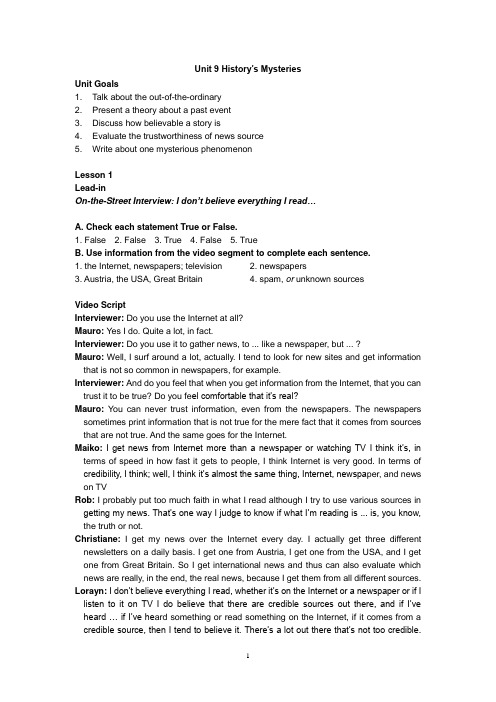
Unit 9 History’s MysteriesUnit Goals1. Talk about the out-of-the-ordinary2. Present a theory about a past event3. Discuss how believable a story is4. Evaluate the trustworthiness of news source5. Write about one mysterious phenomenonLesson 1Lead-inOn-the-Stree t Interview: I don’t believe everything I read…A. Check each statement True or False.1. False2. False3. True4. False5. TrueB. Use information from the video segment to complete each sentence.1. the Internet, newspapers; television2. newspapers3. Austria, the USA, Great Britain4. spam, or unknown sourcesVideo ScriptInterviewer: Do you use the Internet at all?Mauro: Yes I do. Quite a lot, in fact.Interviewer: Do you use it to gather news, to ... like a newspaper, but ... ?Mauro: Well, I surf around a lot, actually. I tend to look for new sites and get information that is not so common in newspapers, for example.Interviewer: And do you feel that when you get information from the Internet, that you can trust it to be true? Do you fe el comfortable that it’s real?Mauro: You can never trust information, even from the newspapers. The newspapers sometimes print information that is not true for the mere fact that it comes from sources that are not true. And the same goes for the Internet.Maiko:I get news from Internet more than a newspaper or watching TV I think it’s, in terms of speed in how fast it gets to people, I think Internet is very good. In terms of credibility, I think; well, I think it’s almost the same thing, Internet, newspa per, and news on TVRob: I probably put too much faith in what I read although I try to use various sources in getting my news. That’s one way I judge to know if what I’m reading is ... is, you know, the truth or not.Christiane:I get my news over the Internet every day. I actually get three different newsletters on a daily basis. I get one from Austria, I get one from the USA, and I get one from Great Britain. So I get international news and thus can also evaluate which news are really, in the end, the real news, because I get them from all different sources. Lorayn:I don’t believe everything I read, whether it’s on the Internet or a newspaper or if I listen to it on TV I do believe that there are credible sources out there, and if I’ve heard … if I’ve he ard something or read something on the Internet, if it comes from a credible source, then I tend to believe it. There’s a lot out there that’s not too credible.You have to be very careful.Interviewer: And how do you try to be careful?Lorayn: If it’s spa m e-mail that comes or something that’s from a source that I don’t know, I tend not to ... not to put 100 percent trust into it. If it comes from the New York Times or if it comes from a reputable source, I tend to take that for 100 percent.ListeningTalk About a MysteryPart 1A. Sound BitesRead and listen to a conversation about a well-known mystery.Teaching Suggestions●Have students look at the image and read the caption. Ask:Who’s Bigfoot? (a hairy human-like creature)Where was he seen? (in the United States)Is this image proof that Bigfoot existed? (no)Why? (because the creature in the image is a man dressed in a costume)Do you think it was ever believed to be proof of Bigfoot’s existence? (Probably. It was taken in 1967, and Bob Heironimus di dn’t tell the truth until 2004.)●Have students read and listen to the conversation.●To check comprehension, ask:What led Victor to believe that Bigfoot exists? (a TV program)What would Patty need to believe Bigfoot exists? (to see it herself)Language note: Could’ve been is the short form used in spoken English of It could have been.There’s no such thing as ... is an expression that means that something does not exist.Culture note: The image is a still from a sixty-second film by Roger Patterson. It was one of the most important pieces of evidence that Bigfoot existed until Bob Heironimus confessed in 2004 that he dressed in a costume for the picture. People have claimed to have seen Bigfoot in the U.S. and Canada for hundreds of years. The creature was originally named Sasquatch, which means hairy giant, by Native Americans and then nicknamed Bigfoot because of large footprints that have been found and are thought to be from this creature.Corpus Notes:The expression buy [that] story is used almost exclusively in informal spoken English.B. Pair WorkRead the conversation again. With a partner, explain the meaning of each of the following statements.Answers will vary, but may include:1. I can’t believe you think that story is true!2. You always doubt everything!3. Bigfoot is definitely real.4. You’ve got to be kidding!5. You think up some crazy things!6. I have to see something with my own eyes to believe it’s true.Teaching Suggestions●Have students find and underline the statements in the conversation and note whosaid them. Encourage students to consider Victor's and Patty's views on the Bigfoot mystery to help them work out the meaning of the expressions.●In pairs, have students write a sentence explaining the meaning of each statement orquestion.●Review as a class. Call on different students to explain the meanings of thestatements.Option:If they haven’t already done so, have students underline the statements from Exercise B. Using their explanations of the meanings of the statements, have pairs think of different ways to say each of the statements. Call on pairs to read the Sound Bites conversation again, substituting the new statements for the underlined ones.Option:In pairs, have students describe Victor’s and Patty’s personalities. If necessary, prompt students by asking Who would you describe as gullible? Who would you describe as skeptical? Have students support their answers with information from the conversation. Encourage students to discuss who they identify with and why.Part 2Discuss How Believable a Story IsA. Word SkillsUsing adjectives with the suffix -able.Teaching Suggestions●Have students listen to the words and study the definitions. Then have students listenand repeat the words chorally.●Point out that words ending in the suffix -able are adjectives. Ask students what verbeach adjective comes from. (believe, debate, prove, question, solve)●To check comprehension, draw a continuum (without the answers) and word box onthe board. With books closed, have students choose the correct words from the box to complete the continuum with:Language note:Be sure students don’t confuse provable with probable, which means possible. Questionable also means possibly not honest or morally wrong; for example, His behavior is highly questionable. While believable implies that something is possibly true,unbelievable implies that something is almost certainly not true.Corpus Notes: The collocation highly questionable occurs much more frequently than very questionable.B. Complete each statement, using an adjective with the suffix -able. Use eachadjective only once.1. questionable2. believable3. debatable4. provable5. unsolvableTeaching SuggestionsHave students compare answers with a partner and review as a class.C. Listening Comprehension.Listen to Part 1 of a historical mystery.What happened to the Russian royal family? What was mysterious about this event?The entire family was murdered. It was mysterious because, until 1991, the bodies had not been found. There was also a woman who claimed to be one of the daughters.ScriptPart 1 [H = male host; J = Professor John Morgan, England]H: Our guest tonight is John Morgan, professor of Russian history at Cambridge University. Professor Morgan, the murder of Czar Nicholas II and the royal family of Russia in 1918 is one of the great mysteries of the twentieth century. Tell us the basic story of what happened.J:Well, in 1917, during the Russian Revolution --- with the end of the Russian monarchy --- the czar’s family was moved from St. Petersburg east to the Ural Mountains, supposedly for their protection. There was, of course, the czar ... his wife Alexandra ...and their children --- four daughters and a son, Alexei, who would have been the next czar --- and also the family doctor and several servants. According to the story, late one evening, they were all brought into a room and told that they were going to have their photograph taken. But to their surprise, soldiers suddenly came into the room firing guns and the entire family was murdered.H: And what makes this story such an enduring mystery?J: Well to begin with, until 1991 at least, no one had ever found the bodies. Stories spread about how the son, Alexei, and maybe also Anastasia, the youngest daughter, had escaped the execution and were still alive. Several women claimed to have been Anastasia --- the most famous person who claimed to have been Anastasia was an Anna Anderson, in Berlin in 1920. Many people found her story very believable, including other members of the Russian royal family. Anna Anderson --- or Anastasia, if you believed her --- died in the United States in 1984.Teaching SuggestionsPre-listening: Ask Who are these people? (the Russian royal family) Elicit from the class any information that they know about the Russian royal family.●Have students read the title, look at the map and photos, and read the captions.●First listening: Have students listen for information about what happened to the royalfamily and why it is a mystery. Then have students discuss in pairs.●Second listening: Have students listen to confirm or correct their answers. (Possibleresponse: They were murdered. It is a mystery because the bodies weren’t found until 1991, and Alexei and Anastasia were said to have escaped. Several women have claimed to be Anastasia.)●To review, have volunteers share their answers with the class.Language note:If necessary, explain the following: enduring(lasting for a long time); czar (ruler of Russia before 1917).Culture note: The October Revolution of 1917 put an end to the absolute monarchies that ruled Russia for centuries. After the revolution, the country was named Union of Soviet Socialist Republics (USSR) under the leadership of Vladimir Lenin, the first dictator of the USSR. Yekaterinburg (on the map) is where the family is believed to have been moved and then killed.D. Now listen to Part 2.What happened in 1991, and what facts did it seem to prove? Why is it still a mystery?Researchers found nine bodies in the Ural Mountains. Medical testing showed that five of them were members of the royal family. But the bodies of the son and one of the daughters were still missing.ScriptPart 2H:Professor Morgan, you mentioned no one had a clue where the bodies were until 1991. Tell us about that.J: Well, people assumed that the bodies must have been lost forever, until 1991, when researchers found nine bodies in the Ural Mountains. Through medical testing they were able to confirm that five of the bodies had to have been Czar Nicholas, his wife, and three of their four daughters.H:That must’ve been pretty exciting news for a lot of people.J: No doubt about it. And they were able to conclude that the other four bodies were definitely not members of the czar’s family. Instead, it was believed that they were most likely the bodies of the doctor and three of the servants. But the bodies of the son, Alexei, and one daughter were still missing.H: Well, what about Anna Anderson, who claimed to be their daughter, Anastasia?Wouldn’t her story have been provable through medical testing too?J: Yes --- and it was. After they found the bodies of the royal family in 1991, medical testing on Anna Anderson’s body proved that she was not a member of the royal family. As a matter of fact, it proved that she wasn’t even Russian!H: How do you like that! Well, that’s one mystery solved.J: Right. But just when we thought the mystery of what happened to their bodies wassolved, a team of scientists have recently argued that the results of the medical testing done on the nine bodies in the 1990s was highly questionable --- poorly done and full of errors, and it might not have proved without a doubt that the bodies were the royal family after all.H:Well, I guess some mysteries just never die, do they?J:Not this one. It might just be an unsolvable case.H:Well, thank you Professor Morgan. That was very interesting.J:Thank you for having me.Teaching Suggestions●Have students listen for the answers to the questions. Ask them to take notes whilethey listen.●To review, call on volunteers to share their answers with the class.Option: On the board, write:1. The results of the medical testing in 1991 are ______ because ______.2. Anna Anderson's story could have been ______ through medical testing if ______.3. Professor Morgan says the mystery might be ______ because ______.Have students complete the first blank with an adjective from Exercise A and the second blank with their own ideas to make a logical sentence. Review as a class. (Possible statements: 1. questionable, a lot of errors were made; 2. provable, it had been properly done; 3. unsolvable, proof of what actually happened may never be found)E. Complete each statement, according to the listening. Listen to Part 2 again ifnecessary.1. a2. b3. a4. aTeaching Suggestions●Have students complete the statements individually and compare answers with apartner.●If necessary, have students listen again to confirm or correct their answers.●In pairs, have students support their answers with information from the listening.●Review as a class. Have students support their answers. For example, 1. The correctanswer is A because Alexei’s body has never been found, so there is no proo f that he was executed.Option: To give students a chance to express their personal opinions, have them speculate about the mystery of Russia’s last royal family in small groups. Ask students to support their views. Encourage the use of perfect modals in the passive voice for speculating about the past. To finish, call on a few volunteers to share their speculations with the class.SpeakingSpeculate About the Out-of-the-ordinaryA. Conversation SnapshotTeaching Suggestions●Before students read and listen, have them look at the photo and predict what thewomen are talking about. To prompt students, ask What is the woman on the left looking at? (her watch) How many plates are there on the table? (three) What do you think they are talking about? (Possible response: the person they are waiting for)●After students read and listen, check comprehension by asking Who are the womenwaiting for? (Stacey) Do they know why she’s late? (no) What might have caused her delay? (the traffic)●Have students read and listen to the ways to say “I don’t know.” Point out that theyare all informal ways to say that you don’t know something. Beats me is very informal, but it is not offensive.Language note: The out-of-the-ordinary is something that is different from what is usual or expected. I’ll bet means that you’re almost sure something is true.Rhythm and Intonation PracticeTeaching SuggestionsHave students repeat chorally. Make sure they:✧pronounce the contraction ’d in She said she’d ...✧use rising intonation for Do you think something happened?✧use falling intonation for Why else would she be late?✧use emphatic stress for sure in I’m sure it’s nothing, for I’ll in I’ll bet she’s ... , for else inWhy else … , and for can’t in I can’t imagine.✧use the following stress pattern:B. Indirect Speech with ModalsTeaching Suggestions●Have a volunteer read the Remember note and the example out loud. Write theexample on the board:“I went to the store.” → She said [that] she had gone to the store.Point to the reporting verb in the indirect speech statement (said) and ask Is this verb in a present or past form? (past) Did the verb in the reported speech change?(yes) How did it change? (went changed to had gone)●Remind students that when the verb in the reported speech changes or “backshifts,”present becomes past and past becomes past perfect.●Have students read the second and third explanations and study the backshifts in theexamples.●Point out that both must and have to change to had to in indirect speech.●Point to the box of modals that backshift and modals that don’t backshift.●Read the Remember box and the example out loud. Remind students to changepronouns and possessives when they change direct speech to indirect speech.●To check comprehension, write on the board:John told Irene, “I may work late because 1 have to finish a report.”Ask What words in these sentences will change when we put them into indirect speech? Circle the words as students respond. (I, may, I, have) Then elicit the correct indirect speech from the class. (John told Irene [that] he might work late because he had to finish a report.)●Have a student read the last explanation out loud. To check comprehension, write thefollowing on the board. Elicit the indirect speech from the class:“They should have known.” → He said _________________.Corpus Notes: Indirect speech occurs much more frequently without that than with.C. Oral WorkChange each sentence from direct to indirect speech and practice with your partner.1. He told me [that] I shouldn’t worry if he arrives a little late.2. He said [that] students had to arrive fifteen minutes early.3. He said [that] Jack might have gotten lost.4. She said [that] they might have forgotten their luggage.5. She told me [that] she’d call me as soon as she got there.6. She told us [that] she might have to cancel the meeting.7. He told me [that] he would come early.8. She told me [that] I ought to phone first.Teaching Suggestions●To review the difference in use between say and tell, ask When do we use say andtell? (We use say when we don’t mention the listener. We use tell when we mention the listener.) Elicit contrasting examples from students. (Possible responses: He said that he would be late; He told me that he would be late.) If necessary, write an example with each verb on the board.●Model the first item with the class. Ask What is going to change in indirect speech?(You → I; I → he; arrive → arrived)●Have students compare answers with a partner and review as a class.ReadingText ABackground InformationAlabamaAlabama is located in the east south central United States, at the southern end of the Appalachian Mountains and on the Gulf of Mexico. It is one of the principal states of the South and is often referred to as the Heart of Dixie. In the course of about 450 years, Spanish, French, British, and Confederate flags, as well as the Stars and Stripes, have flown over Alabama, and residents of the state have a deep-seated sense of history. Alabama entered the Union on December 14, 1819, as the 22nd state. The state capital, Montgomery, became the provisional capital of the Confederate States of America in 1861 and is popularly known as the Cradle of the Confederacy.Key Words and Expressionsconfirm v.证实The new evidence has confirmed the first witness’s story.Research has confirmed that the risk is higher for women.erase v.删除;抹去Unfortunately, the tape has been erased.The World Bank has agreed to erase the debt.knock … out打晕某人Tyson knocked out his opponent in Round 5.The shock from an electric eel is powerful enough to knock a man out. play tricks on 捉弄某人The girls were always playing tricks on their teacher.Fate played a cruel trick on him when he was badly injured in his firstinternational game.Reference Translation今日城市传说城市传说指被普遍认为真实的不确定或离奇故事。
新概念英语第4册第9课自学辅导资料
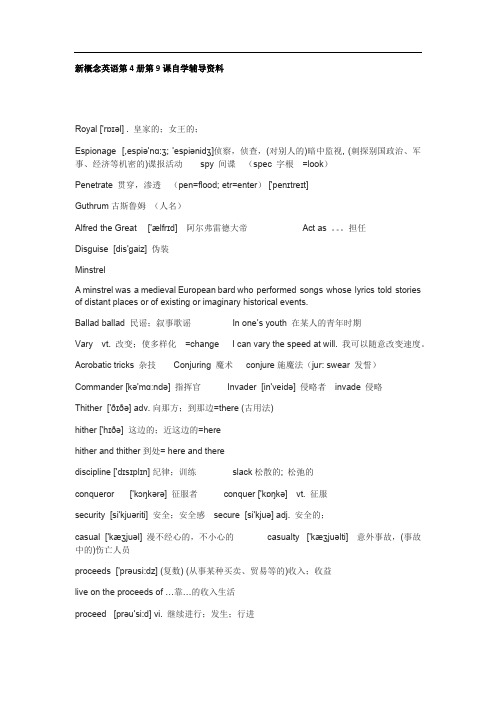
新概念英语第4册第9课自学辅导资料Royal ['rɒɪəl] . 皇家的;女王的;Espionage [,espiə'nɑ:ʒ;'espiənidʒ]侦察,侦查,(对别人的)暗中监视, (刺探别国政治、军事、经济等机密的)谍报活动spy 间谍(spec 字根=look)Penetrate 贯穿,渗透(pen=flood; etr=enter)['penɪtreɪt]Guthrum古斯鲁姆(人名)Alfred the Great ['ælfrɪd]阿尔弗雷德大帝Act as 。
担任Disguise [dis'ɡaiz]伪装MinstrelA minstrel was a medieval European bard who performed songs whose lyrics told stories of distant places or of existing or imaginary historical events.Ballad ballad 民谣;叙事歌谣In one’s youth 在某人的青年时期Vary vt. 改变;使多样化=change I can vary the speed at will. 我可以随意改变速度。
Acrobatic tricks 杂技 Conjuring 魔术conjure施魔法(jur: swear 发誓)Commander [kə'mɑːndə]指挥官 Invader [in'veidə]侵略者invade 侵略Thither ['ðɪðə] adv. 向那方;到那边=there (古用法)hither ['hɪðə]这边的;近这边的=herehither and thither到处= here and therediscipline ['dɪsɪplɪn]纪律;训练slack松散的; 松弛的conqueror ['kɔŋkərə]征服者conquer ['kɒŋkə]vt. 征服security [si'kjuəriti]安全;安全感secure [si'kjuə] adj. 安全的;casual ['kæʒjuəl]漫不经心的,不小心的casualty ['kæʒjuəlti]意外事故,(事故中的)伤亡人员proceeds ['prəusi:dz] (复数) (从事某种买卖、贸易等的)收入;收益live on the proceeds of …靠…的收入生活proceed [prəu'si:d] vi. 继续进行;发生;行进raid 袭击;突袭air raid 空袭region ['riːdʒ(ə)n]地区a life of ease 舒适的生活ease [iːz]轻松,舒适;安逸trivial (tri =three via=way )(三条汇集处,闲聊的地方)琐事trival 微不足道的horde [hɔːd]一大群,群;游牧部落,这里指军队deduce [dɪ'djuːs] vt. 推论,推断be fit for 适合prolonged [prə'lɒŋd]延长的;拖延的;持续很久的commissariat [,kɒmɪ'seərɪət]粮食;粮食补给;(部队的)给养部门,军需部门,后勤部irregular [ɪ'regjʊlə] . 不规则的;无规律的;非正规的be faced with sth 面临(表示一种非主观愿意的状态)risk sth 冒…的危险open battle 正面的战斗open 公开的;敞开的;空旷的harry vt. 折磨;掠夺;骚扰['hærɪ]on the move在活动中,在进行中;四处奔波constantly ['kɒnst(ə)ntlɪ] adv. 不断地;时常地patrol [pə'trəʊl]巡逻;巡逻队;侦察队petrol(英)汽油['petr(ə)l]halt使停止[hɔːlt]raiding parties 突袭的部队party特遣队;分遣队;部队assail [ə'seɪl] vt.困扰;使苦恼;攻击,冲击a series of 一系列的['sɪəriːz;-rɪz]skirmish ['skɜːmɪʃ]小冲突,小规模战斗;小争论 minor battleepisode 插曲;一段情节['epɪsəʊd]unique [juː'niːk] adj. 独特的,稀罕的;[数] 唯一的epic ['epɪk]史诗,叙事诗An epic is a long book, poem, or film whose story extends over a long period of time or tells of great events. 史诗; 史诗般的作品给大家推荐一个英语微信群Empty Your Cup英语微信群是目前学习英语最有效的方法,群里都是说英语,没有半个中文,而且规则非常严格,是一个超级不错的英语学习环境,群里有好多英语超好的超牛逼的人,还有鬼佬和外国美眉。
新概念英语第四册第9课_Royal espionage
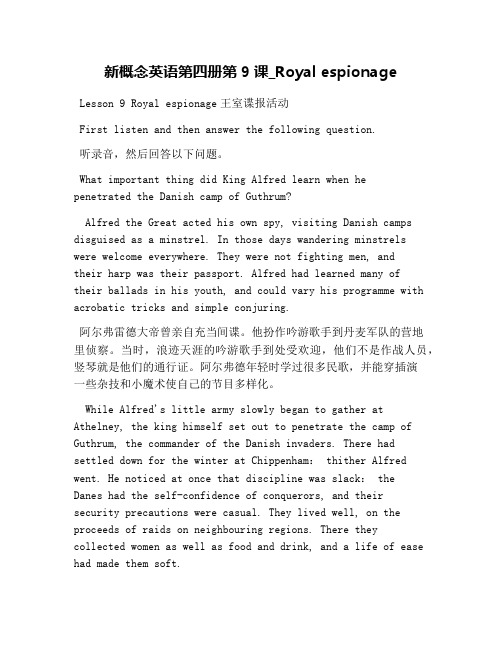
新概念英语第四册第9课_Royal espionageLesson 9 Royal espionage王室谍报活动First listen and then answer the following question.听录音,然后回答以下问题。
What important thing did King Alfred learn when hepenetrated the Danish camp of Guthrum?Alfred the Great acted his own spy, visiting Danish camps disguised as a minstrel. In those days wandering minstrels were welcome everywhere. They were not fighting men, andtheir harp was their passport. Alfred had learned many oftheir ballads in his youth, and could vary his programme with acrobatic tricks and simple conjuring.阿尔弗雷德大帝曾亲自充当间谍。
他扮作吟游歌手到丹麦军队的营地里侦察。
当时,浪迹天涯的吟游歌手到处受欢迎,他们不是作战人员,竖琴就是他们的通行证。
阿尔弗德年轻时学过很多民歌,并能穿插演一些杂技和小魔术使自己的节目多样化。
While Alfred's little army slowly began to gather at Athelney, the king himself set out to penetrate the camp of Guthrum, the commander of the Danish invaders. There had settled down for the winter at Chippenham: thither Alfred went. He noticed at once that discipline was slack: theDanes had the self-confidence of conquerors, and theirsecurity precautions were casual. They lived well, on the proceeds of raids on neighbouring regions. There theycollected women as well as food and drink, and a life of ease had made them soft.阿尔弗雷德人数不多的军队开始在阿塞尔纳慢慢集结时,他亲自潜入丹麦入侵司令官古瑟罗姆的营地。
- 1、下载文档前请自行甄别文档内容的完整性,平台不提供额外的编辑、内容补充、找答案等附加服务。
- 2、"仅部分预览"的文档,不可在线预览部分如存在完整性等问题,可反馈申请退款(可完整预览的文档不适用该条件!)。
- 3、如文档侵犯您的权益,请联系客服反馈,我们会尽快为您处理(人工客服工作时间:9:00-18:30)。
Chinese Food: Vocabulary
1. Kitchen utensils
chopsticks bowls soup spoon
frying pan cooker saucepan
turning shovel fish slice Chinese chopper
oven toaster kettle chopping board
blender fruit and vegetable juice extractor
wok/guo stew pot pressure cooker
microwave oven automatic rice cooker
bamboo steamer egg-beater
grill ice crusher ladle earthenware cooking pot electric stove
2. Preparation of food before cooking
knead mix toss mash pour spread peel
shell squeeze grate crush dice slice
carve shred mince chop sliver seed
pit sift season salt whip drain pluck
3. Seasonings
crystal sugar icing sugar vinegar soy sauce(light/dark soy sauce)
maltose sesame oil sesame paste cornstarch
pepper oyster sauce monosidum glutamate
red chilly powder salt black bean creamed coconut Chinese red pepper star anise/ aniseed bay leaf mustard mint
coriander vanilla cardamom fennel
4. Ways of cooking
fry: to cook sth. in hot fat or oil you can fry meat, fish, eggs, etc. in a shallow pan of hot oil
stir-fry: to cook thin strips of vegetables or meat quickly by stirring them in very hot oil
quick-fry: use small pieces of crisp raw materials, first stir them in the pan rapidly, remove them and added accessories, spices fried quickly deep-fry: to cook food in oil that covers it completely
dry deep-fry: put the seasoning into raw materials, when they fully penetrated, add the adhesions or paste, then put them into the pan to deep-fry
soft deep-fry: put meat into the boiled oil till the pan is 80% ripe and then changed to slow fire
crisp deep frying: soft or steam the material before, hung with the starch and eggs made into a paste and then deep-fry. Wait till the oil hot pot straight out until the material becomes brown. Features are characterized by crisp aroma. Such as the crispy fried duck.
roast/ bake: to cook food, especially meat, without liquid in an oven or over a fire
broil: to cook meat or fish under direct heat or over heat on metal bars grill: to cook food under or over a very strong heat, often for the BBQ baste: pour liquid, fat or juices over meat etc. while it is being cooked braise/stew: to cook meat or vegetables very slowly with a little liquid in a closed container
simmer: to cook sth. by keeping it almost at boiling point
steam: to place food over boiling water so that it cooks in the steam boil: to cook or wash sth. in boiling water
smoke: to preserve meat or fish by hanging it in smoke from wood fires to give it a special taste
mix: to add one substance to others, esp. in cooking
instant boil: folder material, tucked turned into soup, shaking a few, that is, rinse several times
quick-boil: put the food in a boiling water to boil slightly
scald: put the raw food into boiled water or soup, called the burning twice-cooked: re-heat cooked food。
